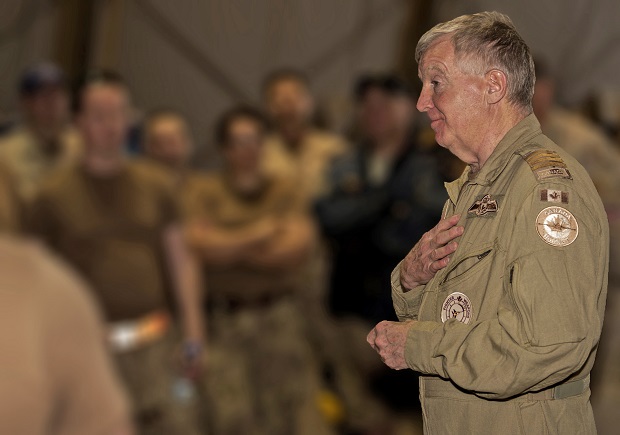Former Conservative MP Laurie Hawn, who was one the country’s first CF-18 fighter pilots, recently announced that he has resigned his position as an honorary colonel in the Royal Canadian Air Force over a disagreement with the government’s interim purchase of 18 Boeing F/A-18 Super Hornet fighter planes.
Hawn has been a vocal supporter of Lockheed Martin’s F-35 Lightning II aircraft as a replacement for the air force’s fleet of 1980s-era CF-18s. He strongly believes that Canada would save billions of dollars by procuring F-35’s instead of the Super Hornets.
According to Hawn, RCAF and Chief of the Air Force Staff, Lt. Gen. Michael Hood asked for his resignation on Saturday.
“Speaking truth to power can be risky. I re-confirmed that this week by speaking out rather more forcefully than was appreciated to the Commander of the RCAF and the Chief of the Defence Staff, on the issue of the CF-18 replacement,” Hawn said in a post on his Facebook page on Monday. “As followers will know, I have been very critical of the 100 per cent politically motivated plan to buy 18 ‘interim’ Super Hornets for some time and the story only gets worse.”
Hawn was MP for Edmonton Centre from 2006 to 2015. He joined the RCAF in 1964. In his 30 years with the air force, Hawn flew the Canadair T-33 Silver Star as an instructor pilot and as a tactical fighter pilot and instructor on the Canadair CF-104 Starfighter and was among the first Canadian military pilots to fly the McDonnell Douglas CF-18 Hornet fighters. Hawn commanded a Hornet equipped tactical fighter squadron at Cold Lake and retired from the RCAF in 1994.
The honorary colonel position that Hawn held does not hold any command or authority. The rank is typically given to former officers and distinguished individuals. The main function of people receiving such rank is to promote the unit of squadron they are attached to.
Related content
Pentagon orders Super Hornet, F-35 comparison test
L-3 MAS partners with Boeing on Super Hornet program
Liberals announce ‘interim purchase’ of 18 Boeing Super Hornets
Where will money for Super Hornets come from?
Last fall, the Liberal government announced it intended to purchase 18 Super Hornets to address the RCAF’s fighter aircraft “capability gap.” The government says it needs the planes badly because its original fleets of 138 CF-18s, has dwindled to just 77. According to Defence Minister Harjit Sajjan, the government will still proceed with an “open and transparent competition” to replace the air force’s entire CF-18 fleet with the delivery of the replacements intended to commerce sometime before the end of Prime Minister Justin Trudeau’s first term of office.
Hawn characterized the capability as “fabricated” and said there were other options being ignored by the government.
For instance, he said, Ottawa could be pursuing the purchase of 27 F-18C/D aircraft which Kuwait is letting go at a “bargain basement price of $300 million. The former fighter pilot said the aircraft are very identical to the CF-18s.
“We could also upgrade our 76 CF-18s to Super Hornet system status for about 20 per cent of what it will cost us to buy 18 Super Hornets,” he said. “Rather than pursue either of those options, we’d rather waste about US$5.4 billion on 18 aircraft with no real increase in capability.”
By Hawn’s reckoning, 90 F-35A jets will around US$8.5 billion (or $94.6 million per plane). He also expects that per unit cost of the F-35 will eventually go down to $85 million during the life of a procurement contract.
In an interview with CBC, Hawn said the commander of the air force was aware of his concerns and that his comments may have been too “specific and direct” for the air force command.
“I know that senior military leaders have their hands tied,” he wrote in his social media post.
To view Hawn’s full Facebook post, click here.

